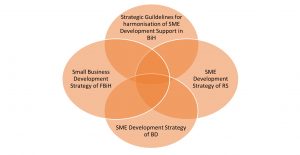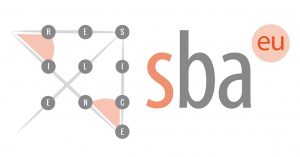The fifth annual conference on supporting the development of SMEs in BiH, whose main highlights you can read here, opened the process of adapting and creating policies and instruments to support the building of resilience of export-oriented SMEs in BiH as a strategic response to sudden external shocks.
On the other hand, it is necessary to adapt the methodology of strategic planning and management of SME development to building the resilience of SMEs in BiH, as a strategic response to sudden external shocks. We made a preliminary version of this methodology back in 2018 together with our partners from institutions responsible for creating strategies and policies to support the development of SMEs at different administrative levels in Bosnia and Herzegovina, namely: Ministry of Foreign Trade and Economic Relations of BiH – Sector for Economic Development and Entrepreneurship; Federal Ministry of Development, Entrepreneurship and Crafts; Ministry of Economy and Entrepreneurship of the RS – Department for SME Development and the Department for Economic Development, Culture and Sports, and the Department for European Integration of Brčko District of BiH. You can download this methodology here. This methodology, with the necessary adjustments “on the fly” to ensure its compliance with the normative and methodological framework for strategic planning and development management, which was adopted in both entities and the Brčko District of BiH, represents a “scaffold” for the preparation of a strategic framework for the development of SMEs in BiH. The preparation is coming to an end with the development of the Small Business Development Strategy for the period 2022-2027. in the Federation of BiH, and the strategic framework looks like this:

Global crises (the COVID-19 pandemic and the energy+economic+political crisis as a consequence of the war in Ukraine) with negative consequences on business are becoming a new reality for SMEs in Bosnia and Herzegovina. These are shocks that cannot be predicted or avoided, so the strategic planning of supporting the development of SMEs is faced with new challenges, the most important of which are the following:
- How to react quickly and effectively in situations of unexpected crises, in which, due to force majeure, SMEs have to temporarily stop business or significantly reduce business activities;
- How to contribute to building the strategic resilience of SMEs to (un)expected crises.
The first challenge refers to a quick response in order to remedy the negative consequences of the crisis in the short term, as soon as possible. The second challenge refers to proactive action in advance, in the long term, and has the character of prevention.
At first glance, only the second challenge has a strategic character, that is, it should be covered by the strategic planning methodology. However, this would underestimate the increasingly loud warning about the impossibility of predicting and planning all future situations, both by theoreticians and by practitioners, and thus once again make it possible to reach a crisis without quick action instruments. That is why good strategic planning of SME development should offer mutually coordinated responses to both challenges.

As for strategic action, i.e. building the strategic resilience of SMEs to crises, it is crucial to focus policies and support instruments on:
- building new business and professional skills for the new economy, which is characterized by an increasing share of knowledge in the creation of added value; for those who run companies, it also means the inclusion of knowledge and tools for managing actions in complex and chaotic situations;
- building an ecosystem for innovative entrepreneurship, both for future companies (start-ups, spin-offs) and for innovations in existing SMEs (development of new products, services, processes and business models);
- digital transformation of SMEs, but also institutions that provide them with services and support;
- facilitating the energy transition of SMEs and the transition to a green economy.
On the other hand, as far as short-term action in crisis conditions is concerned, it is important that support institutions have prepared policies, instruments and means for quick action. Based on experiences with responding to the crisis caused by the Covid-19 virus, this means, first of all:
- disposal of a specific fund of financial resources for quick action (financial support for SMEs which, due to the crisis, have to significantly reduce or temporarily stop business activities);
- simplified, less demanding procedures for SMEs that need support;
- the use of financing instruments that do not increase the debt of SMEs (grants, equity capital, etc.) and the introduction of flexibility in loan repayment, as well as debt restructuring;
- priority focusing of support on sustainable SMEs, which can recover faster and start other companies in the chain with their recovery;
- providing support for particularly vulnerable categories of SMEs;
- targeted support for the reintegration of export-oriented companies into global value chains, as soon as the conditions are met.
Also, for both long-term and short-term action, it is very important to improve monitoring and evaluation systems, both the relevance and effectiveness of policies and support instruments, as well as the operations of SMEs, their success and good practices, because acting in crisis conditions is always a chance for new learning and creation of innovative policies and practices.









